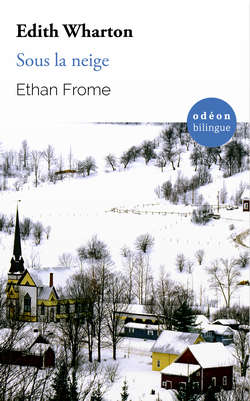Читать книгу Ethan Frome / Sous la neige - Edith Wharton - Страница 15
На сайте Литреса книга снята с продажи.
Оглавление28
Ethan Frome ~Chapter I
“That’s my place,” said Frome, with a sideway jerk of his lame elbow; and in the distress and oppression of the scene I did not know what to answer. The snow had ceased, and a flash of watery sunlight exposed the house on the slope above us in all its plaintive ugliness. The black wraith of a de-ciduous creeper flapped from the porch, and the thin wood-en walls, under their worn coat of paint, seemed to shiver in the wind that had risen with the ceasing of the snow.
“The house was bigger in my father’s time: I had to take down the ‘L,’ a while back,” Frome continued, checking with a twitch of the left rein the bay’s evident intention of turning in through the broken-down gate.
I saw then that the unusually forlorn and stunted look of the house was partly due to the loss of what is known in New England as the “L”: that long deep-roofed adjunct usu-ally built at right angles to the main house, and connecting it, by way of storerooms and tool-house, with the wood-shed and cow-barn. Whether because of its symbolic sense, the image it presents of a life linked with the soil, and enclos-ing in itself the chief sources of warmth and nourishment, or whether merely because of the consolatory thought that it enables the dwellers in that harsh climate to get to their morning’s work without facing the weather, it is certain that the “L” rather than the house itself seems to be the centre, the actual hearth-stone of the New England farm. Perhaps this connection of ideas, which had often occurred to me in my rambles about Starkfield, caused me to hear a wistful note in Frome’s words, and to see in the diminished dwelling the image of his own shrunken body.
29
Sous la neige~ Chapitre I
sous le grand tapis blanc. Un peu plus loin, dans l'immensité monotone du ciel et de la terre, surgissait l'une de ces fermes de la Nouvelle-Angleterre qui semblent élargir la solitude du paysage…
— Voilà ma maison, — me dit Frome, — en faisant un mouvement de son coude estropié.
J'étais tellement accablé par la désolation de la scène que je ne sus que lui répondre. Il ne neigeait plus. Sur la pente, à nos pieds, se dressait la ferme, qu'un pâle rayon de soleil éclairait dans toute sa laideur. Une vigne vierge desséchée pendait au-dessus de la porte, et les murs de bois, sous la peinture écaillée, semblaient grelotter dans le vent.
— La maison était plus importante du temps de mon père ! — continua Frome. — Mais j'ai dû abattre l'L, tout récemment.
Et, se servant du bout de sa rêne gauche comme d'un fouet, il ramena sur le chemin le vieux cheval qui s'apprêtait à franchir la barrière brisée.
Je découvris alors que l'aspect abandonné et minable de la demeure était dû surtout à l'absence de ce corps de logis que nous nommons, dans la Nouvelle-Angleterre, une L. Cette L est un appentis réservé au bûcher et à l'étable, généralement relié en équerre au bâtiment principal de la ferme, avec lequel il communique par la chambre à provi-sions et le magasin à outils. Est-ce par le symbole qu'elle présente, par l'image qu'elle évoque de la vie humaine liée au sol, par ce fait qu'elle détient les sources essentielles de l'existence, — la chaleur et la nourriture, — est-ce plutôt par la pensée consolante qu'elle suggère en nous montrant, sous ce dur climat, la possibilité pour les habitants d'accomplir leurs tâches matinales sans affronter les intempéries, — je ne saurais exactement le dire, mais sûrement cette L, encore plus que la maison elle-même, figure le centre, le foyer, de toute ferme dans la Nouvelle-Angleterre. Et c'était peut-être
